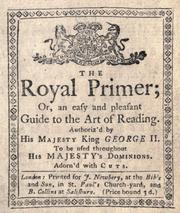
A correspondent has inquired about the pronunciation of the word "primer" in the "introductory textbook" sense.
He noticed that it is often pronounced (or, in his view, mispronounced) "primmer" on the CBC, and feels that this "new" pronunciation is an error introduced by American influence and mindlessly perpetuated by Canadians.
He will no doubt be surprised to learn that nothing could be further from the truth.
"Primmer" is the original pronunciation, and much older than "pry-mer", which seems to date only from the 19th century, likely under the influence of both the spelling, once mass literacy became established, and of the "paint" homonym. There are reasons having to do with the Great Vowel Shift which account for the difference in vowel between "prime" and "primer", but you're probably sick of the GVS by now so I will spare you the details.
As we have seen before with many British/North American differences, older pronunciations and usages brought over here when the first English settlers arrived have often survived on this side of the pond, whereas they have subsequently been corrupted by the British (see this post about herb/erb and this one about height/heighth, for instance). I use the word "corrupt" in the dispassionate linguistic sense of "change" (but also because I like to provoke people!).
The Oxford English Dictionary notes that both pronunciations are in use on both sides of the Atlantic, though "pry-mer" is more common in Britain and "primmer" in the US. The Canadian Oxford also includes both pronunciations, with "pry-mer" first. But my father, for one, pronounced it "primmer".
"Primer" in this sense has quite an interesting history. It comes from a medieval Latin word primarium (a prayer book for lay people). These were often used to teach children how to read, and these "primers" soon became so associated with children's learning that the "first reader" connotations took over from the "prayerbook" connotations of the word. Even after prayers were removed altogether, the word "primer" was still applied to elementary reading books.
I don't think we use "primer" anymore for first readers. It sounds very one-room-schoolhouse to me. But I was surprised to see the types of books that are called primers in this day and age:
A Programmer's Guide to Java SE 8 Certification: A Comprehensive Primer
Multivariate Statistical Methods: A Primer
Feminist Legal Theory (Second Edition): A Primer
Neuropsychological Evaluation of Medically Unexplained Symptoms: Assessment Primer
In fact, primers nowadays seem still to be introductory textbooks, but usually of very advanced, highly technical subject matter. We've come a long way from

Would you use the word "primer"? And if so, how would you pronounce it?
P.S.
If you find the English language fascinating, you might enjoy regular
updates about English usage and word origins from Wordlady. Receive
every new post delivered right to your inbox! If you are not already
subscribed, you can either:
use
the subscribe window at the top of this page
OR
(if
you are reading this on a mobile device): send me an email with the
subject line SUBSCRIBE at wordlady.barber@gmail.com
Privacy
policy: we will not sell, rent, or give your name or address to
anyone. You can unsubscribe at any point.
Follow
me on twitter: @thewordlady
Is this an instance where we in the colonies preserved a habit from the old country, while the originating culture moved on and adapted but no longer influenced us? I remember years ago hearing a dancer from Ukraine observe that folk dancers in Alberta had remained truer to the practices of a century ago than dancers in Ukraine.
ReplyDeleteYes, there are many such instances.
Deletesuch as the pronunciation of French in Quebec, which some (myself included, I must confess) think of sloppy, degraded French. Now people are saying that it is the original speech pattern of those who came here from France, hundreds of years ago, and European French in the meantime has evolved. Similar to the Brit/Amer thing I guess
DeleteQuebec French is a perfectly valid form of French and is not sloppy or degraded. Many of its characteristics are holdovers from the French of the 17th century.
DeleteTwo years (perhaps) too late.
DeleteThank you, Katherine Barber for acknowledging the validity of French spoken in Québec. Not unlike English in North America, a Québecer can travel to France and be understood by their French cousins as we are by our English cousins over the pond. Of course there is nuance, changes to vocabulary etc. But certainly not a bastardized or "degraded" French.
For no other reason than not having been exposed to "primer" in the sense of a introductory text, I have thus far read the "primer" as used in the titles of introductory technical texts as the noun derivative of "to prime", i.e. a text which prepares the way for a more in-depth exposition of the subject. For these reasons, and because I'm a South African both of British descent (which is not to say that my pronunciation is genetically informed, but rather that I adopted that used by my parents and grandparents) and old enough to have had my schooling under a system still heavily influenced by the English standard, I pronounce the word as "pry-mer".
ReplyDelete